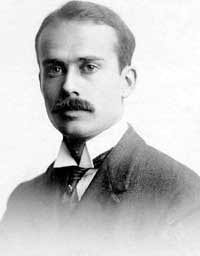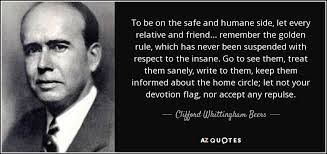A Mind That Found Itself
May 23, 2019 • 232 views
‘A Mind That Found Itself’ (1908) is the autobiographical work of Clifford Whittingham Beers (1876-1943) where he talks about his experiences as an institutionalised mental patient at a time when mental illness lacked attention and respect from the world. The book has influenced many mental health professionals and successfully exhibited the seriousness of psychological disorders to the world at large. Beers was an influential figure in the field of mental hygiene in the United States. He was the founder of the American mental hygiene movement.

Born in New Haven, Connecticut to Ida and Robert Beers on 30th March, 1876, Beers was one of the five children in the household, all of whom suffered from mental distress and were admitted to mental institutions. Beers' brother was diagnosed with epilepsy in 1894 and passed away in 1900. Beers recalls being gripped with the fear that the same fate would befall him: “Doomed to what I then considered a living death, I thought of epilepsy, I dreamed epilepsy…my overweight imagination seemed to drag me to the very verge of an attack”.
In 1900, Beers was admitted to a private mental institution for depression and paranoia. He was later admitted to another institution as well as a state institution. During his stay in these institutions, he witnessed and was subjected to a great deal of maltreatment at the hands of the staff. Apart from the constant surveillance and forced restraint, patients were often choked and assaulted by attendants. The dilapidated cells lacked beds and were heavily barred. Beers, however, seemed to be aware of the circumstances leading to the violent actions of the attendants: “Place a bludgeon in the hand of any man, with instructions to use it when necessary, and the gentler and more humane methods of persuasion are naturally forgotten or deliberately abandoned”.
That the very delusion which drove me to a death-loving desperation should so suddenly vanish would seem to indicate that many a suicide might be averted if the person contemplating it could find the proper assistance when such a crisis impends. ~Beers
After his harrowing experiences in mental institutions, Beers vowed to make a difference in the mental health system. His autobiography, ‘A Mind That Found Itself’, traces the harsh and unscientific treatments he had to encounter and his journey back to health.

Two months after the publication of his book, Beers founded the Connecticut Society for Mental Hygiene in New Haven. In 1909, he established the National Committee for Mental Hygiene which is presently known as Mental Health America, in order to continue the reform for the treatment of the mentally ill. In 1913, he started the Clifford Beers Clinic in New Haven, notably the first outpatient mental health clinic in the United States.
Most sane people think that no insane person can reason logically. But this is not so. ~Beers
Beers fought diligently for the rights of the people with mental illness in institutions and for deinstitutionalisation. He received widespread recognition during his lifetime for his role in the mental health movement. He was awarded an honorary degree by Yale University for his contributions. He was indeed a man who was well ahead of his time. His dedicated service has left an indelible mark in the field of mental health reform.
To leave behind what was in reality a hell, and immediately have this good green earth revealed in more glory than most men ever see it, was one of the compensating privileges which make me feel that my suffering was worthwhile. ~Beers
